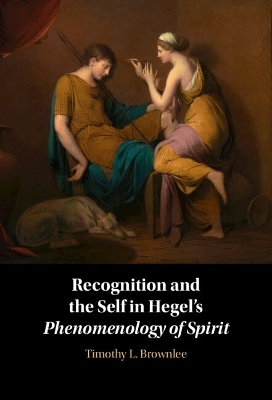
Recognition and the Self in Hegel's Phenomenology of Spirit
Seiten
2022
Cambridge University Press (Verlag)
978-1-009-09823-6 (ISBN)
Cambridge University Press (Verlag)
978-1-009-09823-6 (ISBN)
Hegel's Phenomenology is famed for its account of the problem of recognition; this book presents a novel interpretation of Hegel's work focusing on the themes of recognition and the self. It will be important for scholars and students of Hegel, German idealism, and philosophical questions around recognition.
Hegel's Phenomenology of Spirit is famed for its account of the problem of recognition. Yet while readers agree about the importance of its influential accounts of the struggle to the death and the master/slave relation in developing that problem, there is no consensus regarding what sorts of relations among subjects would count as successful forms of recognition. Timothy Brownlee articulates the essential connections between Hegel's concepts of recognition and the self, and presents a novel interpretation of the Phenomenology that traces the emergence of actual relations of reciprocal recognition through the work as a whole. He focuses on the distinctive social constitution conception of the self that Hegel develops in his account of 'spirit,' and demonstrates that the primary significance of recognition lies in its contribution to self-knowledge. His book will be valuable for scholars and students interested in Hegel, German Idealism, and philosophical conceptions of recognition.
Hegel's Phenomenology of Spirit is famed for its account of the problem of recognition. Yet while readers agree about the importance of its influential accounts of the struggle to the death and the master/slave relation in developing that problem, there is no consensus regarding what sorts of relations among subjects would count as successful forms of recognition. Timothy Brownlee articulates the essential connections between Hegel's concepts of recognition and the self, and presents a novel interpretation of the Phenomenology that traces the emergence of actual relations of reciprocal recognition through the work as a whole. He focuses on the distinctive social constitution conception of the self that Hegel develops in his account of 'spirit,' and demonstrates that the primary significance of recognition lies in its contribution to self-knowledge. His book will be valuable for scholars and students interested in Hegel, German Idealism, and philosophical conceptions of recognition.
Timothy L. Brownlee is Professor of Philosophy at Xavier University where he also directs the Philosophy, Politics, and the Public Honors Program. He is the author of numerous articles on Hegel's practical philosophy and aesthetics, German idealism, and social and political philosophy.
Introduction: Part I. Recognition: 1. Self-consciousness; 2. Sociality; Part II. The Self: 3. Equality and alienation; 4. Conscience; 5. Conclusion; Index.
| Erscheinungsdatum | 07.12.2022 |
|---|---|
| Zusatzinfo | Worked examples or Exercises |
| Verlagsort | Cambridge |
| Sprache | englisch |
| Maße | 158 x 236 mm |
| Gewicht | 500 g |
| Themenwelt | Geisteswissenschaften ► Philosophie ► Geschichte der Philosophie |
| Geisteswissenschaften ► Philosophie ► Metaphysik / Ontologie | |
| Geisteswissenschaften ► Philosophie ► Philosophie der Neuzeit | |
| Sozialwissenschaften | |
| ISBN-10 | 1-009-09823-3 / 1009098233 |
| ISBN-13 | 978-1-009-09823-6 / 9781009098236 |
| Zustand | Neuware |
| Haben Sie eine Frage zum Produkt? |
Mehr entdecken
aus dem Bereich
aus dem Bereich
die kolonialen Wurzeln der französischen Theorie
Buch | Hardcover (2024)
Matthes & Seitz Berlin (Verlag)
28,00 €
eine Geschichte der Zuversicht von Homer bis zum Klimawandel
Buch | Hardcover (2024)
C.H.Beck (Verlag)
28,00 €


